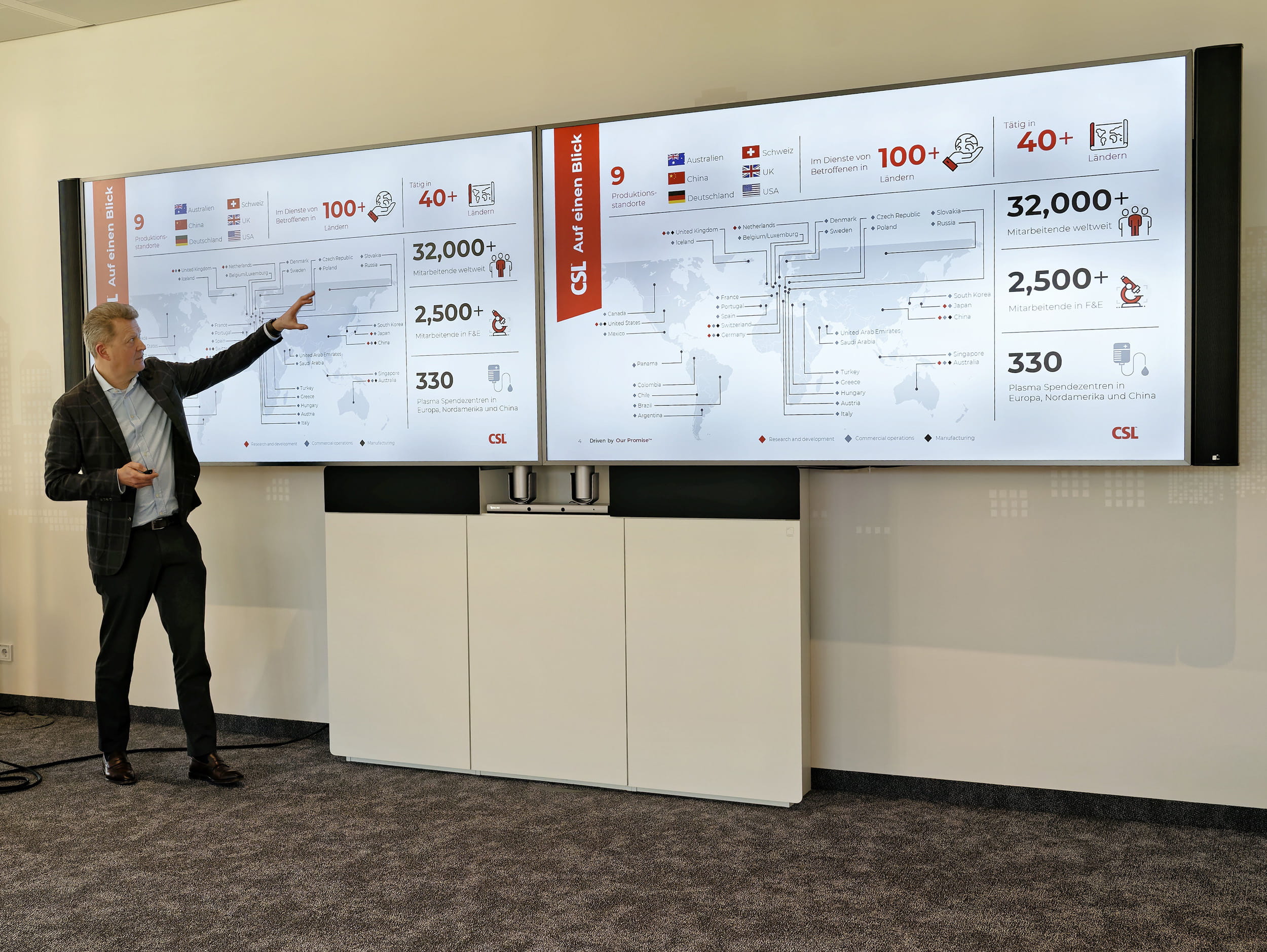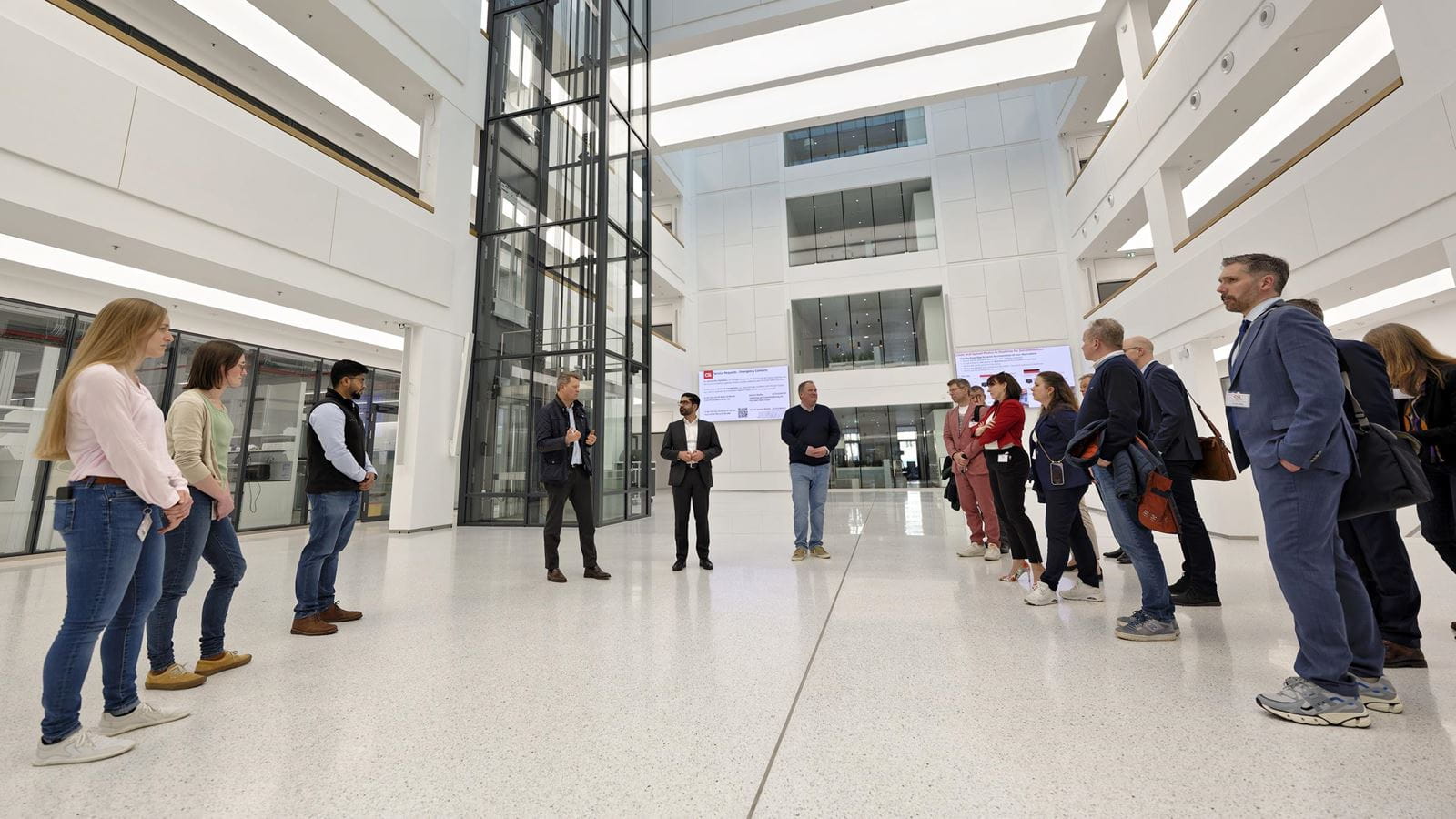A press release by the University City of Marburg
Marburg is an internationally renowned location for research, innovation and business. The city, university, Max Planck Institute and pharmaceutical companies all contribute to its success. During State Minister Kaweh Mansoori's visit to Marburg, the stakeholders emphasized the importance of the location for the region, the state of Hesse and the entire world. Their message to the Minister of Economic Affairs: In order to develop in the best possible way, support from Wiesbaden is needed.
"Marburg is a strong location where people enjoy living. This is further promoted by the good cooperation between the city, the university and the pharmaceutical industry,” said Lord Mayor Dr. Thomas Spies. “We are in close contact, network and support each other and work together to create the best possible framework conditions for the future,” said Spies. “But we can't do everything on our own. We need support. Support from Wiesbaden to further strengthen and advance the region as a center of innovation."
As a center for life sciences and biopharma, Marburg stands for pioneering developments. The location is characterized by innovative strength, international competitiveness and a dynamic research landscape. Cutting-edge research and business work hand in hand in the university city to advance new technologies, train specialists, promote the start-up scene and enable sustainable innovation. Kaweh Mansoori, Hessian Minister of State for Economic Affairs, Energy, Transport, Housing and Rural Areas, visited the university city to take a look at the life science and pharmaceutical industry locations and to talk to representatives from business, research and the city administration. The stakeholders took the opportunity to explain Marburg's importance to Minister of State Mansoori and to ask for appropriate support from the state.
"As an internationally renowned location, Marburg is not only important for the region, but also for the economic strength and future of the state of Hesse - as an employer and manufacturing location. It is therefore important to set the course for the future and competitiveness in good time,” said Mayor Spies. The stakeholders see great potential in Marburg as a location for innovation, in the cooperation to date and in the expansion of cooperation with the state of Hesse.
“As a university, we take responsibility for our region and act as an innovator for various future-oriented projects. And we need a state that stands behind us and joins us in seizing this unique opportunity to develop Marburg as a beacon for cooperation between different areas and disciplines,” emphasized Prof. Dr. Thomas Nauss, President of Philipps-Universität Marburg. He presented forward-looking research topics at the Center for Synthetic Microbiology (Synmikro), on which the university is collaborating with top-class partners such as the Max Planck Institute for Terrestrial Microbiology. Nauss also focused on the network that works together in the region: from the Start-Up Factory and StartMiUp to the Life Science Funnel and the Central Hessen Regional Management and the Central Hessen Research Campus, in which the three Central Hessen universities work together. Prof. Dr. Tobias Erb, Director and Head of the “Biochemistry and Synthetic Metabolism” department at the Max Planck Institute for Terrestrial Microbiology, provided an insight into the institute's research and current developments in the field of innovation and research transfer. He reported on several projects and start-ups in the field of life sciences, using the example of the “Microbes4Climate” Cluster of Excellence, with which the university and Max Planck Institute have entered the final round of the Excellence Strategy of the federal and state governments. This involves the discovery and development of microbial-based processes for the conversion of CO2 and their use for a sustainable circular economy. The decision in the Excellence Strategy will be made in May.
CSL Innovation also highlighted the requirements of its work in the field of research and development of pioneering medicines. “Our goal is to enable our patients to live their lives as comfortably as possible,” said Martin Vey, Managing Director of CSL Innovation GmbH. “In order to remain competitive and innovative as an economic region in Marburg/Mittelhessen in the long term, we need an innovation ecosystem that is open minded, attracts international talent and is appealing for start-ups from the life sciences sector,” Vey continued. The prerequisites for this are in place with strong partners in the form of universities, research institutes, politics and industry, who act as drivers in the implementation of innovative ideas into successful therapeutic products and applications. “This should also be supported in the long term by public funding,” concluded Vey.

" In order to remain competitive and innovative in the long term, we need an innovation ecosystem that is open minded, attracts international talent and is appealing for start-ups from the life sciences sector. "
Dr. Martin Vey, Managing Director CSL Innovation

Good accessibility also plays an important role in the long-term success of the site, according to Pharmapark operator Pharmaserv. For this reason, the pharmaceutical site is hoping for support from the state to ensure that the cycle path to the pharmaceutical site is realized as quickly as possible and that local transport is expanded. “We are seeing a trend away from cars. Younger employees in particular often no longer have a driver's license. This makes it all the more important for our ability to compete for young professionals that we are well connected to the city by public transport and a cycle path,” emphasized Peter Michael Weimar, Managing Director of Pharmaserv GmbH. The site is also focusing on renewable energies in order to become more sustainable, energy-efficient and, in the long term, climate-neutral. However, this also requires a large amount of investment and skilled workers.
According to the business representatives in conversation with Kaweh Mansoori, what was needed in addition to support for the expansion of infrastructure was above all funding and the reduction of bureaucracy in processes in order to be able to compete in the national and international arena in the long term. Closer cooperation between the various ministries on topics and projects that fall under different areas of responsibility would also simplify communication channels and speed up processes. The stakeholders also spoke out in favor of expanding cooperation with schools. After all, an international location also needs a cosmopolitan attitude - as Marburg has already repeatedly demonstrated - and, as a result, international schooling, training and study opportunities.
“It's really impressive what I've seen here today. And when I see how many people are sitting here together and pulling in the same direction despite the different areas they come from, it's remarkable and a strong sign,” said Minister of State Kaweh Mansoori. He also saw the great potential in Marburg and reaffirmed his support for the creative process in Marburg. “I always emphasize how important it is not only to look to the future, but to shape the future,” said Mansoori. “And I can see that this is happening here in Marburg. I am happy to address your concerns and look forward to continuing to communicate with you. I promise that this will not be my last visit to Marburg.”


